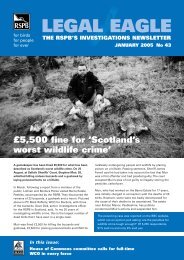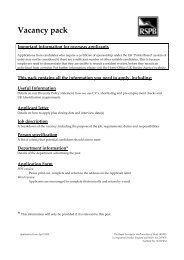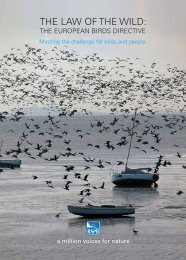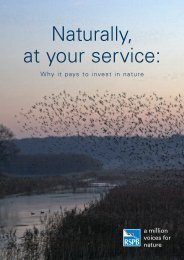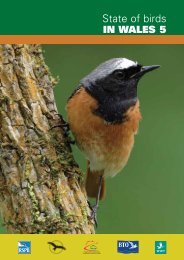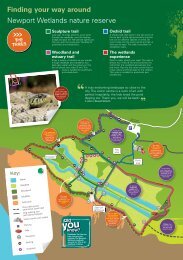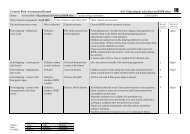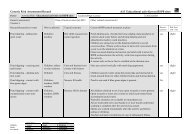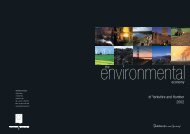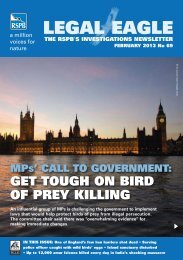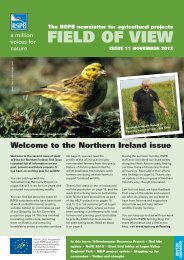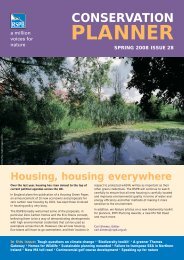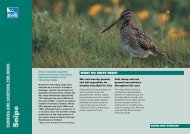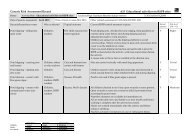State of Nature report - RSPB
State of Nature report - RSPB
State of Nature report - RSPB
You also want an ePaper? Increase the reach of your titles
YUMPU automatically turns print PDFs into web optimized ePapers that Google loves.
Climate change<br />
Climate change is<br />
already affecting UK<br />
wildlife in a number<br />
<strong>of</strong> ways, particularly<br />
in marine and upland<br />
environments. In the<br />
future, the changing<br />
climate is expected to<br />
become an ever more<br />
dominant driver <strong>of</strong><br />
change. Although some<br />
species will benefit, the<br />
overall impact is likely<br />
to be negative. How<br />
negative depends on<br />
how successful we<br />
are at reducing global<br />
greenhouse gas emissions.<br />
Afforestation<br />
Tree cover has doubled in<br />
the UK since the Second<br />
World War. However,<br />
much <strong>of</strong> this consists<br />
<strong>of</strong> conifer plantations<br />
<strong>of</strong> limited benefit to<br />
wildlife. Some generalist<br />
woodland species have<br />
benefitted from increased<br />
tree cover, but a lack <strong>of</strong><br />
active management has<br />
resulted in homogenous<br />
woodland structure<br />
unsuitable for more<br />
specialist species.<br />
Illegal persecution<br />
Wildlife crime remains an issue. The freshwater pearl<br />
mussel is threatened by illegal collection, the illegal<br />
removal <strong>of</strong> plants such as orchids continues and hen<br />
harriers and other raptors are killed throughout the UK<br />
due to perceived conflicts with game hunting interests.<br />
Andy Hay<br />
Andy Hay<br />
Mark Hamblin<br />
Richard Revels<br />
Agricultural intensification<br />
The intensification <strong>of</strong> farming has had far-reaching<br />
and ongoing impacts on wildlife. The loss <strong>of</strong> meadows,<br />
hedgerows and ponds, the increased use <strong>of</strong> pesticides,<br />
the abandonment <strong>of</strong> mixed farming, changes in cropping<br />
and the intensification <strong>of</strong> pastoral farming have all had<br />
a significant impact. However, if properly designed<br />
and funded, agri-environment schemes give farmers<br />
the opportunity to help our farmland nature to recover.<br />
Upland<br />
management<br />
Intensive management<br />
has damaged our uplands<br />
in many ways. Bogs<br />
and mires have been<br />
drained and habitat<br />
damaged by intensive<br />
burning for managed<br />
grouse populations.<br />
Overstocking has led to<br />
heavy grazing pressure<br />
and negative impacts<br />
on wildlife.<br />
Invasive non-native<br />
species<br />
The rate at which<br />
non-native species are<br />
arriving and establishing<br />
in the UK is increasing<br />
across habitats. We<br />
cannot predict accurately<br />
which <strong>of</strong> these might<br />
damage native species<br />
and habitats, but some<br />
will. The introduction<br />
<strong>of</strong> new plant and<br />
animal diseases is just<br />
one threat posed by<br />
non-native species<br />
movements, which could<br />
have serious implications<br />
for UK nature.<br />
STATE OF NATURE 2013 77




